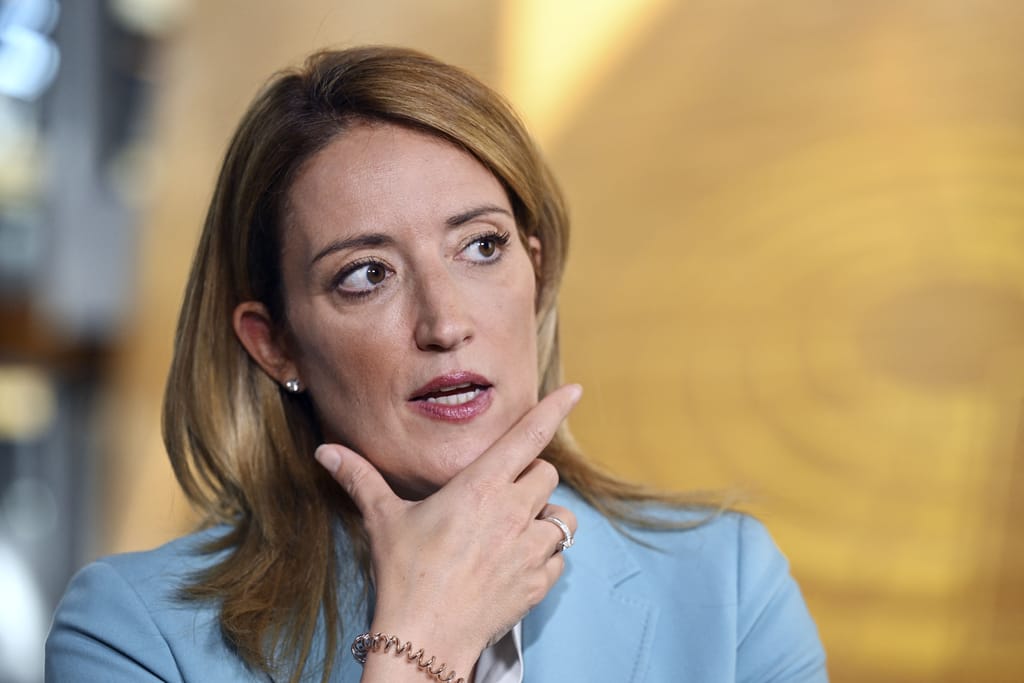Calls are growing among European Parliament members to pause the regular commutes between the chamber’s two seats in Brussels and Strasbourg to conserve resources amid fears of a severe energy crunch this winter.
As the Parliament’s latest plenary session in Strasbourg comes to a close Thursday, a contingent of lawmakers from different parties are arguing they should not return to the eastern French city. German conservative Peter Liese from the European People’s Party — Parliament’s largest group — wrote a letter to Parliament President Roberta Metsola this week, urging her to suspend the commute until April as Russia’s war in Ukraine squeezes the Continent’s energy supply and sends bills skyrocketing.
“If we ask everyone to save energy, it is not responsible to heat two buildings and make unnecessary trips,” Liese said. “During the Corona pandemic, we met only in Brussels for a very long time for good reason. For many people, the energy crisis is worse. That’s why we have to react now as well.”
Parliament Vice President Katarina Barley from the Socialists & Democrats echoed the remarks.
“We should check whether it is possible to close the Parliament buildings in Strasbourg and how much energy this would actually save,” Barley said. “We are in a similar emergency situation as back in COVID times, when the EP in Strasbourg also remained closed.”
But the French strongly oppose stopping the trips to Strasbourg: Several votes have previously been held in attempts to alter the setup, which is enshrined in the EU treaties. French officials, including President Emmanuel Macron, along with local Strasbourg businesses, stress the importance of Strasbourg to the European parliamentary process.
In March 2020, during the COVID pandemic, the late former Parliament President David Sassoli canceled parliamentary sessions in Strasbourg after French authorities designated the area a coronavirus red zone. French officials repeatedly expressed frustration at the decision and MEPs eventually resumed their Strasbourg sessions in December 2020.
A Metsola spokesperson confirmed she received the letter from Liese as well as a total of five messages about energy savings. She plans to respond, the spokesperson noted, though the answer for Liese looks set to be “no” for now.
Parliament’s press services separately said the first priority is “for the EU to stand united” while tackling energy prices and inflation at the same time. This will be the “main thrust” of Metsola’s discussions at the informal EU leaders’ meeting this week in Prague, where energy policies will be a major focus, the spokesperson added.
The spokesperson also pointed to Parliament’s other measures to reduce consumption, such as lowering the temperature within buildings during winter. Parliament has also scrapped millions of euros worth of renovations to its facilities — including plans for new carpet and a bar.
Then again, as temperatures continue to drop and public pressure on politicians rises, the prospect of shuffling between two minimally heated buildings in need of refurbishing some 400 kilometers apart may prompt further MEP complaints.
Liese’s argument, for instance, has been garnering support from groups across the political spectrum, like Martin Schirdewan, co-chairman of The Left Group, who argued the two seats were problematic even before the energy crisis.
EU Parliament president Roberta Metsola plans to respond to the letters asking her to suspend the commute to Strasbourg for all members, though the answer looks set to be “no” for now | Frederick Florin/AFP via Getty Images
“The traveling circus has always been unecological, wasted tax money and cost valuable working time,” Schirdewan said, adding that “it’s finally time to put an end to this once and for all.”
The Greens’ Daniel Freund has been a vocal advocate of halting the trek, also sending a letter to Metsola two months ago pressing her on the issue. Freund told POLITICO that heating and lighting “two huge office complexes” while millions of Europeans worry about their next gas bills “is not acceptable,” saying the monthly trip to Strasbourg should stop “until the energy crisis is over.”
Freund’s group leader, Ska Keller, said there must be “more measures … taken to further reduce any unnecessary energy use,” adding that “it is important to consider all possibilities to further reduce any unnecessary energy use.” But Keller stopped short of backing Freund’s suggestion.
Geert Bourgeois from the European Conservatives and Reformists group called the back-and-forth a “textbook example of duplication and inefficient governance,” adding that “these temporary relocations cost a lot of money” and fly in “total contradiction with the sustainability finger-wagging that the EP always raises.” Bourgeois estimated such travel accounts for about 20,000 tons of CO2 emissions on an annual basis.
There’s a divide over the subject within the Renew Europe group, which is closely linked to Macron.
German MEP Moritz Körner complained that “heating and lighting two blocks of buildings simultaneously in Brussels and Strasbourg is a mockery of taxpayers,” and he added that COVID arrangements proved Parliament can function without the Strasbourg journey.
But a spokesperson for Renew Europe’s group leader Stéphane Sejourné, from France, complained that the Greens and others are taking a “maximalist approach of teleworking and remote voting,” saying “a vibrant continental democracy of 27 member states requires mobility and physical meetings.”
“Questioning the seat of Strasbourg is a false good idea,” Sejourné’s spokesperson said, arguing carbon emissions and electricity consumption would not be reduced but rather relocated elsewhere. Plus, the spokesperson said, the Strasbourg building is “more energy efficient than the ones in Brussels.”
Barbara Moens contributed reporting.



